 A Manual for Writers of Research Papers, Theses, and Dissertations Kate L. Turabian Students Guide to Writing College Papers Kate L. Turabian Writing for Social Scientists Howard S. Becker The Craft of Translation John Biguenet and Rainer Schulte, editors The Craft of Research Wayne C. Booth, Gregory G. Colomb, and Joseph M.
A Manual for Writers of Research Papers, Theses, and Dissertations Kate L. Turabian Students Guide to Writing College Papers Kate L. Turabian Writing for Social Scientists Howard S. Becker The Craft of Translation John Biguenet and Rainer Schulte, editors The Craft of Research Wayne C. Booth, Gregory G. Colomb, and Joseph M.
Williams From Dissertation to Book William Germano Getting It Published William Germano From Notes to Narrative Kristen Ghodsee Writing Science in Plain English Anne E. Greene Storycraft Jack Hart How to Write a BA Thesis Charles Lipson Developmental Editing Scott Norton The Subversive Copy Editor Carol Fisher Saller Legal Writing in Plain English Bryan A. Garner The Chicago Guide to Grammar, Usage, and PunctuationBryan A. GarnerThe University of Chicago Press CHICAGO AND LONDON Bryan A. Garner is president of LawProse Inc. and Distinguished Research Professor of Law at Southern Methodist University.
He is the author of the grammar and usage chapter of The Chicago Manual of Style and editor in chief of Blacks Law Dictionary. His many books on language and law include Garners Modern English Usage and Legal Writing in Plain English, the latter from the University of Chicago Press. The University of Chicago Press, Chicago 60637 The University of Chicago Press, Ltd., London 2016 by Bryan A. Garner All rights reserved. Published 2016. Printed in the United States of America 25 24 23 22 21 20 19 18 17 16 1 2 3 4 5 ISBN-13: 978-0-226-18885-0 (cloth) ISBN-13: 978-0-226-19129-4 (e-book) DOI: 10.7208/chicago/9780226191294.001.0001 Library of Congress Cataloging-in-Publication Data Names: Garner, Bryan A., author.
Title: The Chicago guide to grammar, usage, and punctuation / Bryan A. Garner. Other titles: Chicago guides to writing, editing, and publishing. Description: Chicago : University of Chicago Press, 2016. | 2016 | Series: Chicago guides to writing, editing, and publishing | Includes bibliographical references. | English languageGrammarStudy and teaching (Higher) Classification: LCC PE1106 .G35 2016 | DDC 428.2dc23 LC record available at http://lccn.loc.gov/2015047425  This paper meets the requirements of ANSI/NISO Z39.48-1992 (Permanence of Paper). | English languageGrammarStudy and teaching (Higher) Classification: LCC PE1106 .G35 2016 | DDC 428.2dc23 LC record available at http://lccn.loc.gov/2015047425
This paper meets the requirements of ANSI/NISO Z39.48-1992 (Permanence of Paper). | English languageGrammarStudy and teaching (Higher) Classification: LCC PE1106 .G35 2016 | DDC 428.2dc23 LC record available at http://lccn.loc.gov/2015047425  This paper meets the requirements of ANSI/NISO Z39.48-1992 (Permanence of Paper).
This paper meets the requirements of ANSI/NISO Z39.48-1992 (Permanence of Paper).
To Karolyne Other Books Written or Edited by Bryan A. GarnerGarners Modern English Usage (Oxford Univ. Press, 2016) Grammar and Usage, chap. 5 in The Chicago Manual of Style (Univ. of Chicago Press, 16th ed. 2010) HBR Guide to Better Business Writing (Harvard Business Review Press, 2013) Quack This Way: David Foster Wallace and Bryan A.
Garner Talk Language and Writing (RosePen, 2013) Blacks Law Dictionary (Thomson Reuters, 10th ed. 2014) Garners Dictionary of Legal Usage (Oxford Univ. Press, 3rd ed. 2011) Guidelines for Drafting and Editing Legislation (RosePen, 2016) Reading Law: The Interpretation of Legal Texts, with Justice Antonin Scalia (Thomson/West, 2012) Making Your Case: The Art of Persuading Judges, with Justice Antonin Scalia (Thomson/West, 2008) The Winning Brief (Oxford Univ. Press, 3rd ed. 2013) Garner on Language and Writing, with preface by Justice Ruth Bader Ginsburg (ABA, 2009) Legal Writing in Plain English (Univ. of Chicago Press, 2nd ed. 2013) The Elements of Legal Style, with preface by Charles Alan Wright (Oxford Univ. 2013) The Elements of Legal Style, with preface by Charles Alan Wright (Oxford Univ.
Press, 2nd ed. 2002) The Winning Oral Argument (West, 2009) Ethical Communications for Lawyers (LawProse, 2009) Securities Disclosure in Plain English (CCH, 1999) The Rules of Golf in Plain English, with Jeffrey Kuhn (Univ. of Chicago Press, 4th ed. 2016) A New Miscellany-at-Law, by Sir Robert Megarry (Hart, 2005) Texas, Our Texas: Remembrances of the University (Eakin Press, 1984) Basic Law Terms (West Group, 1999) Criminal Law Terms (West Group, 2000) Family Law Terms (West Group, 2001) Business Law Terms (West Group, 1999) Grammar is the cradle of all philosophy. John of Salisbury (ca. English is everything. English is everything.
For us who speak English, English is everything. English is what we say and what we think. L.A. G. Strong, English for Pleasure (1941) Nobody who thinks or writes can be above grammar. It is like saying, Im a creative genius, Im above conceptswhich is the attitude of modern artists.
If you are above grammar, you are above concepts; and if you are above concepts, you are above thought. The fact is that then you are not above, but far below, thought. Therefore, make a religion of grammar. Ayn Rand, The Art of Nonfiction (1969) I take the candid approach because it fits my teaching situation. My students understand very well what social status means, so I simply tell them, If you speak this way, you go in the back door; if you speak this way, you go in the front door. I make it very clear that I neither built the house nor did I designate the doors.
In this case, I am merely an agent showing off the real estate. I have the key to the front door, and once the student has the concept of usage levels I have given him the key. The back door is always ajar. V. Louise Higgins, Approaching Usage in the Classroom (1960) Contents . . . Introduction1 The field of grammar. In its usual sense, grammar is the set of rules governing how words are put together in sentences to communicate ideasor the study of these rules. Introduction1 The field of grammar. In its usual sense, grammar is the set of rules governing how words are put together in sentences to communicate ideasor the study of these rules.
Native speakers of a language learn them unconsciously. The rules govern most constructions in any given language. The small minority of constructions that lie outside these rules fall mostly into the category of idiom and customary usage. It [the doctrine of usage] asserts that Good use is the general, present-day practice of the best writers. One bone we could pick would be with that best. How are they the best writers except by using the words in the best ways? We settle that they are the best writers because we find them using their words successfully.
We do not settle that theirs is the right, the good usage of the words because they use them so. Never was there a crazier case of putting the cart before the horse. It is as though we were to maintain that apples are healthy because wise people eat them, instead of recognizing that it is the other way aboutthat it is what the food will do for us which makes us eat it, not the fact that we eat it which makes it good food. I. A. Richards
Next page

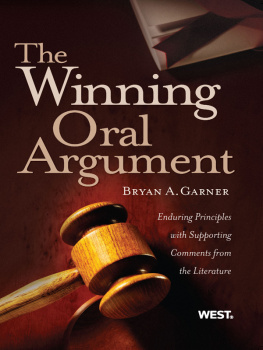
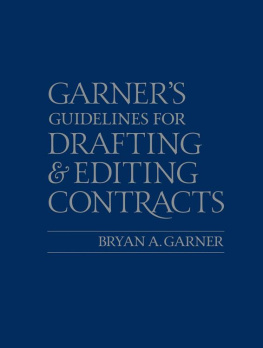
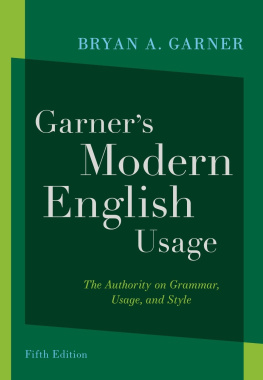
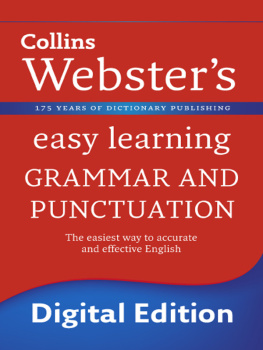
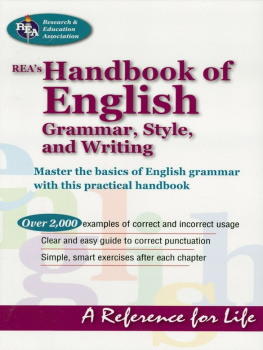
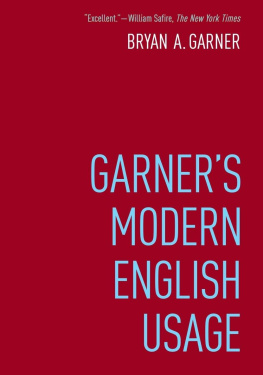
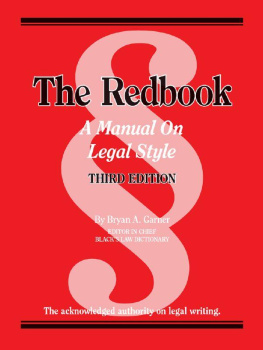
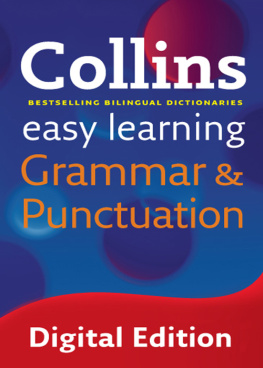
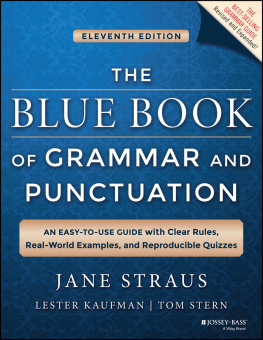
 A Manual for Writers of Research Papers, Theses, and Dissertations Kate L. Turabian Students Guide to Writing College Papers Kate L. Turabian Writing for Social Scientists Howard S. Becker The Craft of Translation John Biguenet and Rainer Schulte, editors The Craft of Research Wayne C. Booth, Gregory G. Colomb, and Joseph M.
A Manual for Writers of Research Papers, Theses, and Dissertations Kate L. Turabian Students Guide to Writing College Papers Kate L. Turabian Writing for Social Scientists Howard S. Becker The Craft of Translation John Biguenet and Rainer Schulte, editors The Craft of Research Wayne C. Booth, Gregory G. Colomb, and Joseph M. This paper meets the requirements of ANSI/NISO Z39.48-1992 (Permanence of Paper). | English languageGrammarStudy and teaching (Higher) Classification: LCC PE1106 .G35 2016 | DDC 428.2dc23 LC record available at http://lccn.loc.gov/2015047425
This paper meets the requirements of ANSI/NISO Z39.48-1992 (Permanence of Paper). | English languageGrammarStudy and teaching (Higher) Classification: LCC PE1106 .G35 2016 | DDC 428.2dc23 LC record available at http://lccn.loc.gov/2015047425